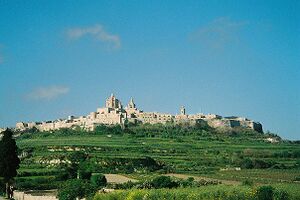
Events[edit | edit source]
Community energy[edit | edit source]
Power generation from photovoltaic (PV) solar cells is increasing in Malta, with total kWp (kilowatt peak) capacity growing by 16.9% from 2017 to 2018. Domestic rooftop installations account for the overwhelming majority of PV installations, and hold 52.1% of total kWp capacity. As of December 2019, EU-funded government grants allowed households to reclaim 50% of the installation costs up to a value of €2,300 from the government. Grants for rooftop solar water heaters, which are popular in Malta, as well as solar feed-in tariffs are also available to help people consider the installation of solar panels.
In October 2017, the Planning Authority approved the 'Solar Farm Policy', aimed at providing appropriate criteria for potential future utility-scale solar farm developments with minimal negative impacts on the landscape, particularly targeting disused quarries, car parks, industrial areas and large rooftops. Since then, multiple utility-scale solar farms been proposed to the planning authority. An 8,000 panel site has been approved at a disused landfill site near Birżebbuġa in February 2019.
A 2018 pilot project led by MCAST was conducted to investigate the potential of floating off-shore solar farms to provide energy for Malta.
Electric vehicles[edit | edit source]
As of March 2022, there were 6,000 electric vehicles registered in Malta.
Cycling[edit | edit source]
The popularity of cycling in Malta as a sport, a means of commuting, and as a way of exploring the island of Malta is on the increase. In recent years, the Maltese authorities, most notably the Malta Transport Authority, have worked hard to make this activity more accessible and safer .
Arts, sport and culture[edit | edit source]
A 2010 Charities Aid Foundation study found that the Maltese were the most generous people in the world, with 83% contributing to charity.
Maltese folktales include various stories about mysterious creatures and supernatural events. These were most comprehensively compiled by the scholar (and pioneer in Maltese archaeology) Manwel Magri in his core criticism "Ħrejjef Missirijietna" ("Fables from our Forefathers"). This collection of material inspired subsequent researchers and academics to gather traditional tales, fables and legends from all over the Archipelago. While giants, witches, and dragons feature in many of the stories, some contain entirely Maltese creatures like the Kaw kaw, Il-Belliegħa and L-Imħalla among others.
About Malta[edit | edit source]
Malta ( MOL-tə, MAWL-tə, Maltese: [ˈmɐːltɐ]), officially the Republic of Malta, is an island country in Southern Europe located in the Mediterranean Sea. It consists of an archipelago 80 km (50 mi) south of Italy, 284 km (176 mi) east of Tunisia, and 333 km (207 mi) north of Libya. The two official languages are Maltese and English. The country's capital is Valletta, which is the smallest capital city in the EU by both area and population. With a population of about 542,000 over an area of 316 km2 (122 sq mi), Malta is the world's tenth-smallest country by area and the ninth most densely populated. Various sources consider the country to consist of a single urban region, for which it is often described as a city-state.
Malta has been inhabited since about 5900 BC. Its location in the centre of the Mediterranean has historically given it great geostrategic importance, with a succession of powers having ruled the islands and shaped its culture and society. These include the Phoenicians, Carthaginians, Greeks, and Romans in antiquity; the Arabs, Normans, and Aragonese during the Middle Ages; and the Knights Hospitaller, French, and British in the modern era. Malta came under British rule in the early 19th century and served as the headquarters for the British Mediterranean Fleet. It was besieged by the Axis powers during World War II and was an important Allied base for North Africa and the Mediterranean. Malta achieved independence in 1964, and established its current parliamentary republic in 1974. It has been a member state of the Commonwealth of Nations and the United Nations since independence; it joined the European Union in 2004 and the eurozone monetary union in 2008.